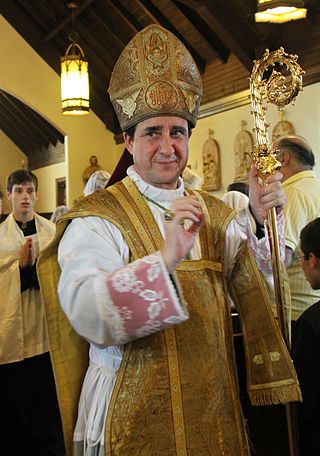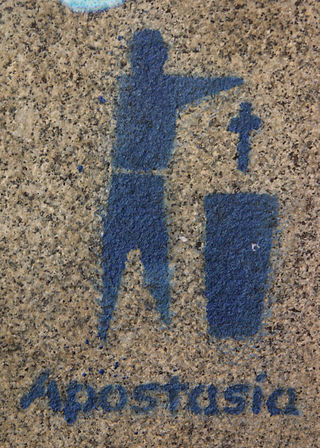
A prelate is a high-ranking member of the Christian clergy who is an ordinary or who ranks in precedence with ordinaries. The word derives from the Latin praelatus, the past participle of praeferre, which means 'carry before', 'be set above or over' or 'prefer'; hence, a prelate is one set over others.
In law, motu proprio describes an official act taken without a formal request from another party. Some jurisdictions use the term sua sponte for the same concept.
Decretals are letters of a pope that formulate decisions in ecclesiastical law of the Catholic Church.

The Apostolic Canons, also called Apostolic canons, Ecclesiastical Canons of the Same Holy Apostles, or Canons of the Holy Apostles, is a 4th-century Syrian Christian text. It is an Ancient Church Order, a collection of ancient ecclesiastical canons concerning the government and discipline of the Early Christian Church, allegedly written by the Apostles. This text is an appendix to the eighth book of the Apostolic Constitutions. Like the other Ancient Church Orders, the Apostolic Canons uses a pseudepigraphic form.
Ecclesia Dei is the document Pope John Paul II issued on 2 July 1988 in reaction to the Ecône consecrations, in which four priests of the Society of Saint Pius X were ordained as bishops despite an express prohibition by the Holy See. The consecrating bishop and the four priests consecrated were excommunicated. John Paul called for unity and established the Pontifical Commission Ecclesia Dei to foster a dialogue with those associated with the consecrations who hoped to maintain both loyalty to the papacy and their attachment to traditional liturgical forms.

Alfonso de Galarreta Genua,, is a Spanish-born Argentine bishop of the Society of Saint Pius X. Bishop de Galarreta has served as the First Assistant of the Society of Saint Pius X, working under the direction of the Superior General Fr. Davide Pagliarani, since 2018. In addition to this, Bishop de Galaretta has been the President of the SSPX—Vatican Commission since 2009, which directs the Society's correspondence with the Holy See.
The Code of Canons of the Eastern Churches is the title of the 1990 work which is a codification of the common portions of the canon law for the 23 Eastern Catholic Churches in the Catholic Church. It is divided into 30 titles and has a total of 1546 canons. The code entered into force in 1991.
In the canon law of the Catholic Church, an impediment is a legal obstacle that prevents a sacrament from being performed either validly or licitly or both. The term is used most frequently in relationship to the sacraments of Marriage and Holy Orders. Some canonical impediments can be dispensed by the competent authority as defined in Catholic canon law.
The Corpus Juris Canonici is a collection of significant sources of the canon law of the Catholic Church that was applicable to the Latin Church. It was replaced by the 1917 Code of Canon Law which went into effect in 1918. The 1917 Code was later replaced by the 1983 Code of Canon Law, the codification of canon law currently in effect for the Latin Church. The Corpus juris canonici was used in canonical courts of the Catholic Church such as those in each diocese and in the courts of appeal at the Roman Curia such as the Roman Rota.
Collections of ancient canons contain collected bodies of canon law that originated in various documents, such as papal and synodal decisions, and that can be designated by the generic term of canons.

A formal act of defection from the Catholic Church was an externally provable juridic act of departure from the Catholic Church that existed between 1983 and 2010.
The Liber Septimus may refer to one of three Catholic canon law collections of quite different value from a legal standpoint which are known by this title.
The term Extravagantes is applied to the canon law of the Roman Catholic Church, to designate some papal decretals not contained in certain canonical collections which possess a special authority. More precisely, they are not found in Gratian's Decretum or the three official collections of the Corpus Juris Canonici.

The 1983 Code of Canon Law, also called the Johanno-Pauline Code, is the "fundamental body of ecclesiastical laws for the Latin Church". It is the second and current comprehensive codification of canonical legislation for the Latin Church of the Catholic Church. The 1983 Code of Canon Law was promulgated on 25 January 1983 by John Paul II and took legal effect on the First Sunday of Advent 1983. It replaced the 1917 Code of Canon Law which had been promulgated by Benedict XV on 27 May 1917.
In the canon law of the Catholic Church, excommunication is a form of censure. In the formal sense of the term, excommunication includes being barred not only from the sacraments but also from the fellowship of Christian baptism. The principal and severest censure, excommunication presupposes guilt; and being the most serious penalty that the Catholic Church can inflict, it supposes a grave offense. The excommunicated person is considered by Catholic ecclesiastical authority as an exile from the Church, for a time at least.
The Catholic Church utilizes the oldest continuously functioning legal system in the West, much later than Roman law but predating the evolution of modern European civil law traditions. The history of Latin canon law can be divided into four periods: the jus antiquum, the jus novum, the jus novissimum and the Code of Canon Law. In relation to the Code, history can be divided into the jus vetus and the jus novum. Eastern canon law developed separately.
The matrimonial nullity trial reforms of Pope Francis are the reforms of Catholic canon law governing such trials, made public 8 September 2015. The reforms were effected by two separate apostolic letters from Pope Francis: the motu proprioMitis iudex dominus Iesus amending the 1983 Code of Canon Law, and the motu proprioMitis et misericors Iesus amending the Code of Canons of the Eastern Churches. This was in response to the bishops who, during the Synod on the Family of 5-9 October 2014, called for simplification of the procedure whereby a legally invalid marriage is declared null.
The Eastern Catholic canon law is the law of the 23 Catholic sui juris (autonomous) particular churches of the Eastern Catholic tradition. Eastern Catholic canon law includes both the common tradition among all Eastern Catholic Churches, now chiefly contained in the Code of Canons of the Eastern Churches, as well as the particular law proper to each individual sui juris particular Eastern Catholic Church. Oriental canon law is distinguished from Latin canon law, which developed along a separate line in the remnants of the Western Roman Empire, and is now chiefly codified in the 1983 Code of Canon Law.
The jurisprudence of Catholic canon law is the complex of legal theory, traditions, and interpretative principles of Catholic canon law. In the Latin Church, the jurisprudence of canon law was founded by Gratian in the 1140s with his Decretum. In the Eastern Catholic canon law of the Eastern Catholic Churches, Photios holds a place similar to that of Gratian for the West.





